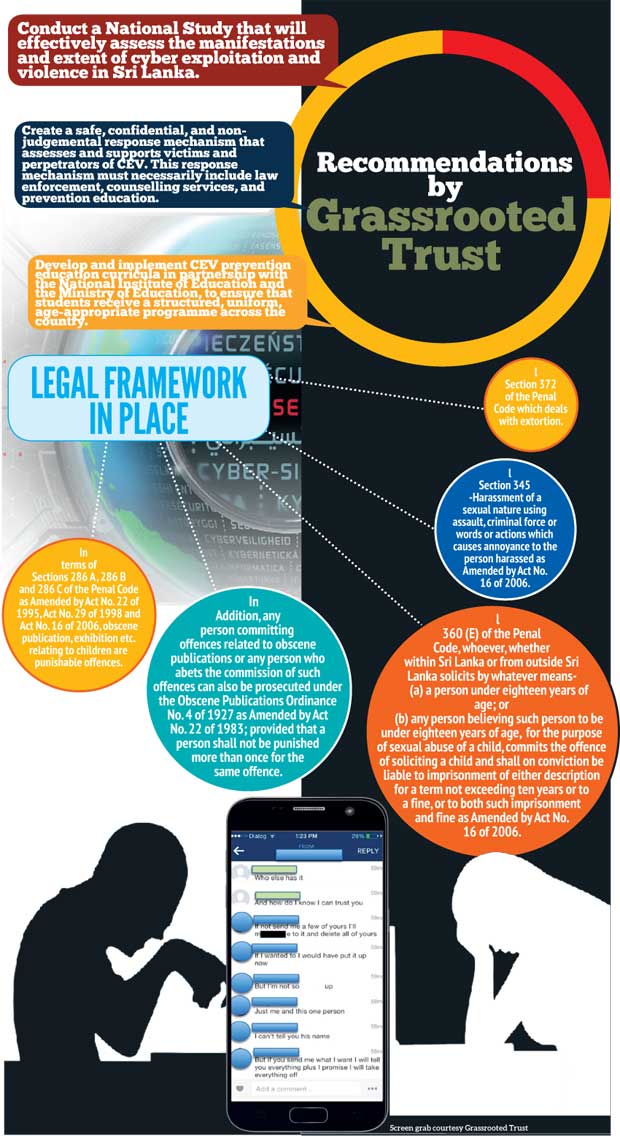Reply To:
Name - Reply Comment
Last Updated : 2024-04-19 06:03:00

 What is the value of a smartphone? It isn’t the price tag that’s stuck on the box. But when it comes to the access to information, how valuable can a smartphone be? The thousands of possibilities made available to smartphone users are baffling. The task of unlocking such possibilities may seem impossible, but for many most young people using a smartphone and handling the internet are effortless tasks.
What is the value of a smartphone? It isn’t the price tag that’s stuck on the box. But when it comes to the access to information, how valuable can a smartphone be? The thousands of possibilities made available to smartphone users are baffling. The task of unlocking such possibilities may seem impossible, but for many most young people using a smartphone and handling the internet are effortless tasks.
In a country like Sri Lanka, where many parents value tradition and don’t encourage open conversations regarding stigmatized topics, a smartphone is a treasure trove of information for any child. And due to this continuous, unfiltered access to information on social media and the internet, children are exposed to a wide array of information which gives rise to issues such as cyber exploitation. The Daily Mirror spoke to Grassrooted Trust and the National Child Protection Authority (NCPA) and learned that technology and the internet coupled with the belittling attitude we have towards certain members of society opens up a whole new can of worms.
As defined by bakamoono.lk, “Cyber exploitation and violence (CEV) is when someone is bullied, blackmailed, threatened, discriminated, and/or coerced online. This includes the non-consensual distribution or publication of intimate photos or videos online as well as any other material via memes, and edited images.” According to an article published by Open Democracy titled “Investigating Sri Lanka’s ‘nude’ culture” by Hans Billimoria, we learn that Grassrooted Trust’s engagement with cyber exploitation has changed since they had been approached by a group of 70 girls who were being blackmailed because of naked pictures and videos they had shared with their boyfriends. Billimoria writes that the issue is well known by schoolgoing children and the practice of sharing nude pictures with your partner were deemed as natural and normal. Girls were furthermore under the impression that their boyfriends would never betray them and being shamed for sharing their nudes was unthinkable. He further wrote that the exploitation had become more methodical and violent. “The group of 70, for example, were being blackmailed via a false account on Instagram Direct with the simple calculated threat – I have your naked picture. Send me the naked picture of another girl. Or see what I do with yours”
 The blackmailing party had further built a database of naked pictures and videos of young Sri Lankan women and girls categorized under names, schools, description of the picture and/or video i.e. top, bottom, front, back. “Except, those weren’t the names of the categories. They were far more sexually explicit, purposely used to capture the imagination of the young men, and perhaps women, that peruse the database.Sample lists of this database are sent out to young men in relationships with requests for naked pictures of their girlfriends, with the promise of FREE access to the entire database as a valued contributor. And of course, young men who had just ended a relationship, or had one ended, were also approached; the angry, hurt, resentful and indifferent who maybe more primed to share their girlfriends’ nudes and videos.”
The blackmailing party had further built a database of naked pictures and videos of young Sri Lankan women and girls categorized under names, schools, description of the picture and/or video i.e. top, bottom, front, back. “Except, those weren’t the names of the categories. They were far more sexually explicit, purposely used to capture the imagination of the young men, and perhaps women, that peruse the database.Sample lists of this database are sent out to young men in relationships with requests for naked pictures of their girlfriends, with the promise of FREE access to the entire database as a valued contributor. And of course, young men who had just ended a relationship, or had one ended, were also approached; the angry, hurt, resentful and indifferent who maybe more primed to share their girlfriends’ nudes and videos.”
Billimoria further wrote that one perpetrator had hacked into Facebook Messenger and had tried to convince other girls to take part in a fabricated UN Women Campaign by completing 15 tasks that began with “a picture of the colour of your shirt” and subsequently went on to ask the girl to undress and pose for the camera in an explicit manner.
“It is still difficult to identify under which laws cyber crime or cyber exploitation is going to be governed and no law reforms have happened with regard to this.” -
Hans Billimoria,
Grassrooted Trust.
Speaking to Grassrooted Trust the Daily Mirror further learned that there hasn’t been much of a change since 2015 and that the conversation about this issue needs to be moved forward.“The CID admitted to us to the fact that a market has been created for these images and for these videos and young people have access to this market.
And when you have created this market it’s about supply and demand and you need to feed this market. It has been two years after the story broke free. We have gone to the NCPA, ICTA and the Ministry of Telecom and Digital Infrastructure. We have had discussions with the Ministry of Education and were facilitated by the NCPA. But it’s still difficult to identify under which laws cyber crime or cyber exploitation is going to be governed as no law reforms have happened with this regard,” said Hans Billimoria of Grassrooted Trust. Sri Lanka does have an existing legislative framework, within which perpetrators of cyber exploitation and violence can be prosecuted. Billimoria further stated that they have two major concerns; the lack of a response mechanism and absence of preventive education.
Speaking of the lack of a response mechanism he said,“Take a case that I was dealing with. A girl sent pictures to her boyfriend at the age of fifteen. She is now 20, at an international university and the boyfriend is also at another international university in another country. Now some third party has gotten hold of her pictures and is blackmailing her saying that ‘unless you come and tease me, in front of the camera, naked, I am going to publish these pictures’. This is a standard story. One issue that we are dealing with is that the relationship that she has with her father has hitherto been an obstacle to her coming out and saying, ‘listen I have made this mistake, please help me.’ And that is why we keep reinforcing open lines of communication between parents and children, because we don’t want a young person or any person to be further victimized because of that relationship. So that is one area that we want to focus on in terms of response; that is the ability to approach the family.”
“Secondly, what we need to look at is where do these young people go? Where does anyone go if this happens? Your instinct is to go to the police station. For example, in another case we dealt with, we shall name the individual girl X, she told us what the situation was. We decided to go to the police station that was closest to her to file a complaint. We were told by the person in charge of the women’s desk at the police station that it would be better for us to file a complaint at the Computer Crimes Division which works along with CERT Sri Lanka at the BMICH. When we went to the BMICH we couldn’t find this Computer Crimes Branch. Then we went to CERT who told us that there was no computer crimes branch at the BMICH. And I said to them “isn’t it interesting that your your police station thinks that there is a computer crimes branch at the BMICH and thereby is directing victims of cyber crime to the computer crimes branch of the CID”. What they said was that the victims would then come to them and they would direct them to where they should go. When I outlined the case to CERT they directed us to the CID,” he continued.
He further stated that the current response mechanism in place is too long winded. “We aren’t blaming CERT, or the CID, or the police. Far from it. I think that they are definite allies in this process, but there is definite concern to be able to negotiate this response mechanism. The CID is very responsible and very sensitive. But accessing the CID is the challenge not the CID itself. This process needs to be made simpler.
Especially with a crime where the potential for the proliferation of content is getting shared rapidly, the process is not the immediate removal of the content, but writing a letter to the director of the CID. Because how many people are going to go through the long daunting tunnel to access the CID?”
Speaking of the existing need for preventive education, Billimoria highlighted the issue of ‘violation of trust and consent’. “Consent is given to be filmed in that space for each other. But they didn’t give consent to become porn stars. It’s that violation of consent that I keep going back to. Even in prevention education, at Grassrooted we focus on three areas. One area respected; self respect and respect for others. The second area that we focus on is being sensible; thinking through actions, think before you share, thinking about the power that we hold by a boy or a girl, depending on who shares that naked picture. The last one is about consent; understanding what consent means and understanding that it’s not the sharing of the picture that is the violation, but rather the violation of trust.
“For us it’s the violation of the trust and the consent that is the issue. It goes back to the point how we treat another person and what has been put in our head about how we treat other people. That is why this is an extension of other forms of violence. One extension of attitudes and extension of patriarchy that feed gender based violence, because again, it is about something as simple as what we call the “baduwa” “kella” culture, where we constantly reduce women to sexual objects. If you take a look at the images we see, it’s always that very sexually exploited nature of those objects that we see; parts of the woman. Or at the very least we see the full frontal of the woman; where the woman is looked at as a commodity. So this conversation has progressed to how women are commodities in this porn industry, especially in this home based porn. We really need to take a close look at that,” he added.
“Consent is given to be filmed in that space for each other. But they didn’t give consent to become porn stars. It’s that violation of consent that I keep going back to. Even in prevention education, at Grassrooted we focus on three areas. One area respected; self respect and respect for others.
Is it fault of technology?
“It’s not. It is the manifestation of our attitude towards women and girls,” said Sharanya Sekaram, Grassrooted Trust.
“I think what is important to look at is that often cyber exploitation is recognized as something separate, something that has manifested because of technology. It’s not. It is the manifestation of our attitude towards women and girls. We say women and girls because that is primarily who we deal with. It is the manifestation of the violence that women and girls have faced on the streets, in the bedrooms, in relationships. It’s a form of gender based violence. And perhaps the only real difference is that it’s much easier to perpetrate. You can hide behind the screen and nobody needs to know who you are. But I think it is very important to keep reiterating that it’s not new, it’s not because of technology, it’s not this generation. If you take away Facebook, Snapchat and all those things, it won’t change a thing. It’s really that we treat women and girls badly. We have allowed this violence to appear in so many forms. There’s no difference, at least for me, between a man who hits his wife and a man or boy who circulates pictures of his ex girlfriend afterwards. It’s sexual violence,” said Sekaram.
“We need to take a look again at the relationship between children and parents. We also need to take a look at this notion of shame around discussing sex. Or this notion of shame around taking a naked picture and the damage that it’s causing or the potential damage that it can do. Where there is a device that can record whether it’s a phone with a camera, where there is a relationship between a boy and a girl, regardless of where you are in the country, there is an exchange of naked pictures, that is a reality,” added Billimoria.
“Children at schools I’ve been to know exactly what’s happening. When I spoke to an 11-year-old boy, who was a part of a larger work group, he knew exactly how to articulate what “nudes” are. So the information is out there, but the information isn’t with those who are less savvy about what is possible on the smartphone. What is the role of the Ministry of Education? What is the role of the National Institute of Education? Why hasn’t anything happened during the last two years, although the NCPA has been talking about this and a special task force has been set up which we are a part of? In terms of prevention and responsibility, these are key questions that need to be asked. We would like to promote this discussion and see who would be responsible here,” he concluded.
“This is a form of severe child abuse” -NCPA Chairperson Marini de Livera
Commenting on the issue, NCPA Chairperson Marini de Livera stated that, “This is a form of severe child abuse and NCPA is doing everything in her power to prevent and protect children from this scourge.”
She further said, “Children should be offered guidance by parents and teachers and other responsible individuals that although the internet has many plus points- such as being a store house of knowledge and an effective medium of communication-it has to be used with a sense of responsibility, concern for others and a strong sense of duty.You should be careful not to harm yourself. And also you must not harm others through the use of this medium. It should be used for the benefit of society, not to destroy individuals and cause grief to them.”
“Everyone should assume responsibility of ensuring protection of children from cyber violence-parents, teachers, religious leaders, all professionals, youth leaders, Parliamentarians, Policy Makers and the general Public” she added.


Add comment
Comments will be edited (grammar, spelling and slang) and authorized at the discretion of Daily Mirror online. The website also has the right not to publish selected comments.
Reply To:
Name - Reply Comment
On March 26, a couple arriving from Thailand was arrested with 88 live animal
According to villagers from Naula-Moragolla out of 105 families 80 can afford
Is the situation in Sri Lanka so grim that locals harbour hope that they coul
A recent post on social media revealed that three purple-faced langurs near t

10 Apr 2024
09 Apr 2024